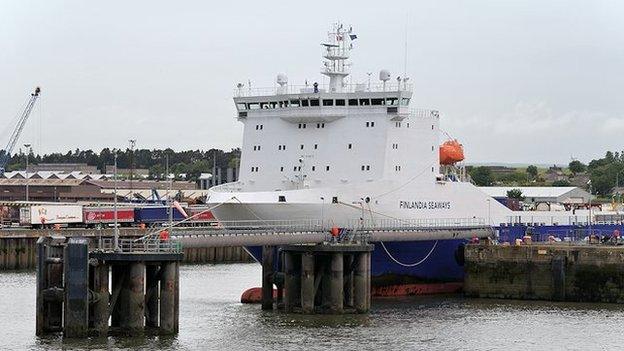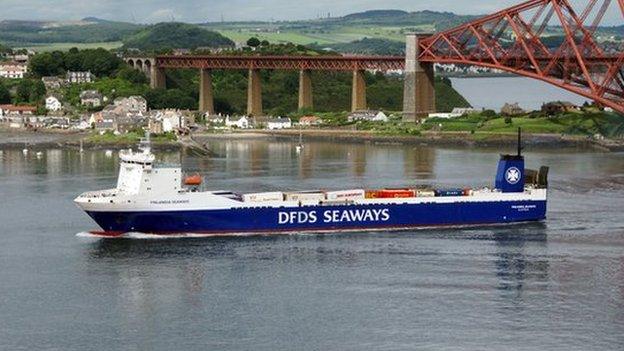Rosyth - Zeebrugge ferry freight service axed after fire
- Published

Ferry operator DFDS has axed its freight service between Rosyth and Zeebrugge in Belgium following a fire on one of its ships.
The vessel is out of action following the blaze in an engine room and the ferry company said it had been unable to find a suitable replacement.
It was a loss-making route for DFDS and it said it had now "lost all hope" of reversing its fortunes.
The firm said it had "no alternative" but to close the route.
The Scottish government said Humza Yousaf, the transport secretary, would seek to hold urgent discussions with the company following the announcement.
A spokesman added that the minister wanted to fully understand the situation and "explore all options for the route".
DFDS said the fire broke out on its ro-ro freight ship Finlandia Seaways on 16 April.
One crew member was injured in the blaze. He was airlifted to hospital where he is being treated for injuries caused by smoke inhalation.
The ship was towed to Immingham, Lincolnshire, where the cargo was removed and an inspection was carried out.
In a statement, external Kell Robdrup, of DFDS, said: "The inspection revealed substantial damage to the ship's engine room, and we estimate that it will be out of service for several months for repairs.
"Furthermore, our search for a replacement vessel was fruitless and revealed that there are no suitable ships available.
"Unfortunately, this will bring about further losses on the route, and it means that we have lost all hope of being able to turn around the route's loss-making situation.
"Therefore, we have no alternative but to close the route as we undoubtedly will lose clients who will be forced to seek alternative solutions for their transport."
'Reopening unrealistic'
He said DFDS was "extremely sorry" for the effect the decision would have in Scotland and Belgium.
The closure would affect a "very limited number of people" employed by the ferry company, he added.
"In cooperation with the Scottish government and the port, we have tried everything in our power to save the route," he said.
"This included going from a combined passenger and cargo ship to a freight ship, reducing costs by enabling double stacking of containers and reducing fuel costs by installing a scrubber to remove sulphur from the exhaust gas instead of using expensive, low-sulphur fuel.
"However, the route continued to make losses. And with the new situation with the ship out of service for months, the market, the customers and the financial situation will be negatively affected, and make a turnaround and a reopening unrealistic."
The freight service between Rosyth and Zeebrugge has been operating since 2002.
Charles Hammond, group chief executive of Forth Ports, which operates the Port of Rosyth, said they were "very disappointed" by the closure.
He added: "Scotland remains well connected with continental Europe through the range of multimodal services operating from the Port of Grangemouth.
"Grangemouth is Scotland's largest container terminal and provides connectivity to locations in the UK, mainland Europe and the rest of the world through its feeder network. We will work hard to ensure that as many affected customers as possible can be accommodated from Grangemouth.
"The Port of Rosyth is among Scotland's best connected ports, with a range of opportunities currently being explored for the port as a whole."
- Published12 November 2014
